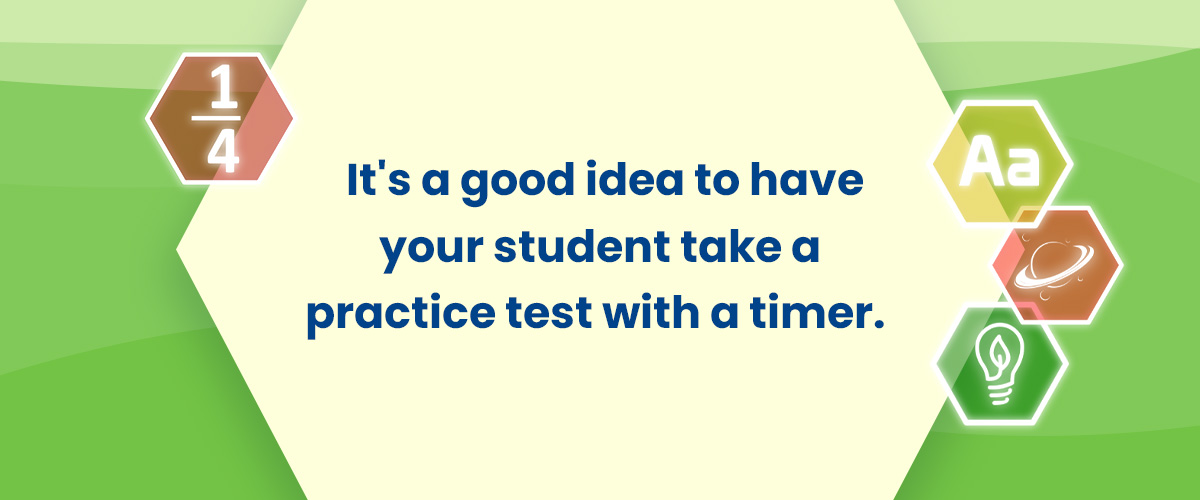Standardized testing assesses homeschoolers’ strengths and allows parents to determine which topics need attention. Some states have requirements for standardized testing, whereas others leave it up to the parents’ discretion to decide if they want to test their students. Standardized tests are available in various subjects, such as math, reading and science.
At Power Homeschool, we offer a wealth of resources to equip students for success when completing standardized testing. Learn more about Power Homeschool and browse our courses to create a standardized test prep plan for your child!
How to Prepare Your Homeschooler for Standardized Testing
Standardized tests can measure the knowledge your student has gained in the classroom, plus life skills such as critical thinking and comprehension. If you and your homeschooler think standardized testing is the ideal way to help them achieve their academic goals, you have multiple options to help them prepare before, during and after the test and give them the best chance of success.
Before the Test
Standardized testing is different than typical homeschool testing. Luckily, depending on when you and your student decide to take the test, you may have weeks or months to prepare. The following tips can help your student confidently enter their standardized testing session.
Understand the Test Format
Understanding standardized test structure will give a student an idea of what to expect. These tests often include various question types, including multiple-choice, true/false and written answers.
Homeschool parents should help students review specific subjects before evaluation. You can also discuss strategies such as quickly moving on to the next question to save time when they do not know an answer.
Ensure your child has all the required documents and tools when taking the test in person, including a pencil, eraser and calculator.
Try Some Study Techniques for Standardized Tests
Here are a few tips for effective studying for standardized tests:
- Study for a few hours every day.
- Get enough sleep the day before the test.
- Practice reading comprehension.
- Create a study schedule to balance practice time and your regular homeschool curriculum.
Some standardized assessments provide practice tests. Homeschoolers can use these tools to become familiar with the test process. Let your student know that those exact questions won’t appear on the tests so they don’t waste time memorizing specific questions and answers.
Use a Timer

Since standardized tests often have multiple timed sections, it’s a good idea to have your student take a practice test with a timer. You can also use a timer to see how long it takes your child to complete specific sections and use this as a baseline to help them lower their times with each practice run.
Teach Them How to Fill out a Scantron
While it may seem simple, many people fill out scantrons incorrectly. As you teach your homeschooler to fill out their scantron, emphasize that they should completely black out each bubble. This simple tip can help your student reduce the risk of the machine misreading an answer and falsely marking it incorrect.
Test Day Tips
When the day of the test arrives, it’s normal for your student to feel nervous. Here are some homeschool testing tips they can follow.
Set up a Quiet Area
In some cases, you may be able to have your student take their test at home. If so, you’ll want to create a quiet, distraction-free area so your child can focus during their homeschooling standardized testing session. As their teacher, you will want to stay close enough to monitor your child throughout the test but not so close that they lose focus.
Try to Help Your Student Manage Anxiety
If your learner feels anxious, that’s OK. Encourage them to use the following tips to handle anxiety:
- Try relaxation techniques.
- Close your eyes and breathe deeply.
- Get enough sleep each night.
- Exercise to ease stress and tension.
- Speak to a parent or teacher for help.
Follow Test Day Best Practices
Use these guidelines to prepare your homeschooler for the big day:
- Eat a healthy meal before the test.
- Have snacks and water on hand for energy.
- Get to the test site or log in early.
Plan Break Time for Your Homeschooler After the Test
Continue supporting your child after they complete the standardized test to recognize their accomplishment.
Because standardized tests can be stressful, plan some unstructured free time after the exam for your child do relax. Whatever hobby or activity they choose to do after their test, make sure they leave the testing space for a change of scenery so they can return feeling refreshed.
Reflect on the Results
Depending on the standardized test your student completes, you may have to wait a days or months to receive the results. During the waiting period, you can ask your homeschooler how they thought the test went and if they had trouble with any specific concepts or questions.
Once their results arrive, take the time to sit down with your child and go over their score together. As you review the report, you can use it to identify any future growth areas or update your student’s current curriculum.
During the reflection period, you should also take the time to recognize the hard work your child has put into the exam and express that you’re proud of them for completing the test regardless of their final score.
Standardized Testing Resources and Support
Standardized testing for homeschoolers can identify learning areas that need improvements. Before evaluating your child, ensure your state and school district accept the test method and take the necessary steps to help your student prepare.
Identifying growth areas is essential to building a learner’s skills and knowledge. It ensures a well-rounded education that allows them to harness their strengths and become motivated to improve the skills they have yet to gain.
Power Homeschool provides resources for homeschooling parents and students to support learning before, during and after standardized testing. You can sign your child up for any of our hundreds of self-paced courses anytime. Browse the core fundamentals, plus engaging electives like music, art, coding, 3D printing, foreign languages and more!
We are here to help if you have any questions. Contact us by completing our online form today.



